|
Equities were mostly lower for the week as investors stayed on the sidelines and waited for Fed Chair Janet Yellen's speech Friday morning to the Kansas City Fed's annual symposium in Jackson Hole, Wyoming. Reaction to the speech was initially muted but became choppy later in the trading day. It was a quiet week, with little new economic data. Volatility was low and markets were thin.
Traders' sentiment has seesawed in recent weeks. Questions about how aggressive the Fed will be in its approach to future monetary tightening were raised. The Fed increased borrowing costs in December 2015 for the first time since June 2006.
Ms Yellen said the Fed remains on course to raise its fed funds interest rate in the coming months. She said that the continued solid labor market performance along with the outlook for economic activity and inflation have strengthened the case for a fed funds increase. She highlighted the solid growth of consumer spending in addition to the string of firm employment gains. Her comments followed similar remarks by other Fed officials in recent days that have made it clear that a rate increase is on the table. But most of Ms Yellen's speech was devoted to a longer-term question — whether the Fed will be ready when the next recession comes.
The Fed predicts that it will not raise interest rates nearly as high as during previous periods of economic growth. That means it will not be able to match the depth of the rates cuts it used to combat previous recessions. However, the Fed in recent years had shown that other kinds of stimulus could also be effective. These tools include commitments to keep rates low for an extended period and large scale asset purchases, which reduce the supply of available investments forcing investors to accept lower interest rates.
| |
|
2015 |
2016 |
% Change |
|
Index |
Dec 31 |
Aug 19 |
Aug 26 |
Week |
2016 |
| Asia/Pacific |
|
|
|
|
|
|
| Australia |
All Ordinaries |
5344.6 |
5625.4 |
5607.36 |
-0.3% |
4.9% |
| Japan |
Nikkei 225 |
19033.7 |
16545.8 |
16360.71 |
-1.1% |
-14.0% |
| Hong Kong |
Hang Seng |
21914.4 |
22937.2 |
22909.54 |
-0.1% |
4.5% |
| S. Korea |
Kospi |
1961.3 |
2056.2 |
2037.50 |
-0.9% |
3.9% |
| Singapore |
STI |
2882.7 |
2844.0 |
2857.65 |
0.5% |
-0.9% |
| China |
Shanghai Composite |
3539.2 |
3108.1 |
3070.31 |
-1.2% |
-13.2% |
|
|
|
|
|
|
|
| India |
Sensex 30 |
26117.5 |
28077.0 |
27782.25 |
-1.0% |
6.4% |
| Indonesia |
Jakarta Composite |
4593.0 |
5416.0 |
5438.83 |
0.4% |
18.4% |
| Malaysia |
KLCI |
1692.5 |
1687.7 |
1683.09 |
-0.3% |
-0.6% |
| Philippines |
PSEi |
6952.1 |
7930.8 |
7845.49 |
-1.1% |
12.9% |
| Taiwan |
Taiex |
8338.1 |
9034.3 |
9131.72 |
1.1% |
9.5% |
| Thailand |
SET |
1288.0 |
1538.8 |
1549.41 |
0.7% |
20.3% |
|
|
|
|
|
|
|
| Europe |
|
|
|
|
|
|
| UK |
FTSE 100 |
6242.3 |
6859.0 |
6838.05 |
-0.3% |
9.5% |
| France |
CAC |
4637.1 |
4400.5 |
4441.87 |
0.9% |
-4.2% |
| Germany |
XETRA DAX |
10743.0 |
10544.4 |
10587.77 |
0.4% |
-1.4% |
| Italy |
FTSE MIB |
21418.4 |
16310.1 |
16843.99 |
3.3% |
-21.4% |
| Spain |
IBEX 35 |
9544.2 |
8450.6 |
8659.50 |
2.5% |
-9.3% |
| Sweden |
OMX Stockholm 30 |
1446.8 |
1393.6 |
1411.65 |
1.3% |
-2.4% |
| Switzerland |
SMI |
8818.1 |
8127.3 |
8168.32 |
0.5% |
-7.4% |
|
|
|
|
|
|
|
| North America |
|
|
|
|
|
|
| United States |
Dow |
17425.0 |
18552.6 |
18395.40 |
-0.8% |
5.6% |
|
NASDAQ |
5007.4 |
5238.4 |
5218.92 |
-0.4% |
4.2% |
|
S&P 500 |
2043.9 |
2183.9 |
2169.04 |
-0.7% |
6.1% |
| Canada |
S&P/TSX Comp. |
13010.0 |
14687.5 |
14639.88 |
-0.3% |
12.5% |
| Mexico |
Bolsa |
42977.5 |
48297.5 |
47369.570 |
-1.9% |
10.2% |
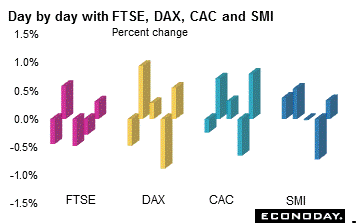 Equities rallied Friday after Fed Chair Janet Yellen said that the case for another interest rate increase has strengthened. Indexes with the exception of the FTSE were up on the week. On the week, the FTSE was down for a second week, this time by 0.3 percent. The CAC, DAX and SMI rebounded from the previous week's losses. The CAC advanced 0.9 percent, the DAX was up 0.4 percent and the SMI added 0.5 percent. Ms Yellen's comments spurred optimism about the economic recovery, while she reiterated that the Fed will take a gradual approach to raising borrowing costs. Equities rallied Friday after Fed Chair Janet Yellen said that the case for another interest rate increase has strengthened. Indexes with the exception of the FTSE were up on the week. On the week, the FTSE was down for a second week, this time by 0.3 percent. The CAC, DAX and SMI rebounded from the previous week's losses. The CAC advanced 0.9 percent, the DAX was up 0.4 percent and the SMI added 0.5 percent. Ms Yellen's comments spurred optimism about the economic recovery, while she reiterated that the Fed will take a gradual approach to raising borrowing costs.
A key economic release during the week was the German Ifo survey and the weak results weighed on investor sentiment. Business confidence dropped unexpectedly to a six month low in August and marked the biggest monthly decline in more than four years as companies assessed the current situation and future expectations more poorly after Brexit. French manufacturing confidence also declined unexpectedly in August to a low reading last seen in June 2015. However, Spain's economic growth remained stable in the second quarter. Gross domestic product climbed 0.8 percent on the quarter. British retail sales volume increased in August after declining in the prior month according to the Distributive Trades Survey from the Confederation of British Industry.
 Equities were mixed last week — investors preferred to stay on the sidelines as they anxiously waited for Fed Chair Janet Yellen's Friday speech. Markets here were closed for the week prior to the speech. It was a quiet week with little new economic data. Losses ranged from 1.2 percent (Shanghai Composite) to 0.1 percent (Kospi). Gains ranged from 0.4 percent (Jakarta Composite) to 1.1 percent (Taiex). Equities were mixed last week — investors preferred to stay on the sidelines as they anxiously waited for Fed Chair Janet Yellen's Friday speech. Markets here were closed for the week prior to the speech. It was a quiet week with little new economic data. Losses ranged from 1.2 percent (Shanghai Composite) to 0.1 percent (Kospi). Gains ranged from 0.4 percent (Jakarta Composite) to 1.1 percent (Taiex).
In Japan, equities were down three of five days with the largest losses occurring on Friday after the release of a dismal July consumer price index. Stocks hit a three week low as the yen firmed up against the U.S. dollar and the consumer price index dropped for the fifth straight month mainly due to declining crude oil prices. Core consumer prices fell 0.5 percent from a year earlier, marking the biggest decline in more than three years.
Earlier in the week, traders remain fixated on what Janet Yellen would say at her speech where many hoped for some guidance as to when and at what pace the Fed will raise interest rates. However, some analysts say that even the expectation of guidance was wishful thinking.
Two new central bank governors will be taking over in September. Both were serving as deputy governors prior to their appointments. In Australia deputy governor Philip Lowe was tapped to become governor in the spring. On Saturday, August 23, India's Prime Minister Narendra Modi appointed Urjit Patel, a deputy governor at the Reserve Bank of India, to be the Bank's next governor. He will be replacing current chief Raghuram Rajan, who two months ago surprised markets by announcing he would step down when his term ends in September. His appointment makes it certain that Rajan's hawkish monetary policy stance will be maintained.
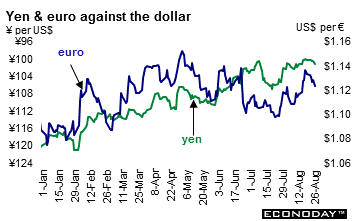 The U.S. dollar rallied against the euro, yen, Swiss franc and the Canadian and Australian dollars last week. However, it retreated against the pound sterling as better than anticipated economic data provided a boost for the currency. The U.S. dollar advanced on Friday after Fed Chair Yellen's comments regarding the health of the economy and the nearing possibility of a fed funds increase. A rate increase would impact the U.S. currency as higher rates make a currency more attractive to investors who are looking for yield. The U.S. dollar rallied against the euro, yen, Swiss franc and the Canadian and Australian dollars last week. However, it retreated against the pound sterling as better than anticipated economic data provided a boost for the currency. The U.S. dollar advanced on Friday after Fed Chair Yellen's comments regarding the health of the economy and the nearing possibility of a fed funds increase. A rate increase would impact the U.S. currency as higher rates make a currency more attractive to investors who are looking for yield.
|
|
2015 |
2016 |
% Change |
|
|
Dec 31 |
Aug 19 |
Aug 26 |
Week |
2016 |
| U.S. $ per currency |
|
|
|
|
|
|
| Australia |
A$ |
0.7288 |
0.762 |
0.756 |
-0.8% |
3.8% |
| New Zealand |
NZ$ |
0.6833 |
0.728 |
0.724 |
-0.5% |
5.9% |
| Canada |
C$ |
0.7231 |
0.778 |
0.770 |
-1.0% |
6.4% |
| Eurozone |
euro (€) |
1.0871 |
1.133 |
1.120 |
-1.2% |
3.0% |
| UK |
pound sterling (£) |
1.4742 |
1.308 |
1.314 |
0.4% |
-10.9% |
|
|
|
|
|
|
|
| Currency per U.S. $ |
|
|
|
|
|
|
| China |
yuan |
6.4937 |
6.653 |
6.670 |
-0.2% |
-2.6% |
| Hong Kong |
HK$* |
7.7501 |
7.753 |
7.757 |
0.0% |
-0.1% |
| India |
rupee |
66.1537 |
67.061 |
67.059 |
0.0% |
-1.3% |
| Japan |
yen |
120.2068 |
100.140 |
101.830 |
-1.7% |
18.0% |
| Malaysia |
ringgit |
4.2943 |
4.016 |
4.017 |
0.0% |
6.9% |
| Singapore |
Singapore $ |
1.4179 |
1.346 |
1.360 |
-1.0% |
4.3% |
| South Korea |
won |
1175.0600 |
1117.510 |
1113.780 |
0.3% |
5.5% |
| Taiwan |
Taiwan $ |
32.8620 |
31.666 |
31.680 |
0.0% |
3.7% |
| Thailand |
baht |
36.0100 |
34.640 |
34.650 |
0.0% |
3.9% |
| Switzerland |
Swiss franc |
1.0014 |
0.9594 |
0.9782 |
-1.9% |
2.4% |
| *Pegged to U.S. dollar |
|
|
|
|
|
|
| Source: Bloomberg |
|
|
|
|
|
|
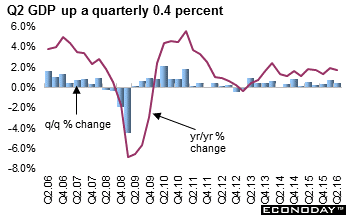 Second quarter gross domestic product was up 0.4 percent and 1.8 percent from a year ago. Among the expenditure components, capital investment was down 2.1 percent on the quarter after edging up 0.1 percent in the first quarter. Household consumption added 0.2 percent while government consumption slowed by more than half from a 1.3 percent gain to a 0.6 percent second quarter increase. Inventories subtracted 0.1 percentage point from the quarterly GDP growth. Quarterly GDP change would have been negative had it not been for a 0.6 percentage point contribution from the trade balance, where exports increased by 1.2 percent on the quarter while imports fell 0.1 percent. Second quarter gross domestic product was up 0.4 percent and 1.8 percent from a year ago. Among the expenditure components, capital investment was down 2.1 percent on the quarter after edging up 0.1 percent in the first quarter. Household consumption added 0.2 percent while government consumption slowed by more than half from a 1.3 percent gain to a 0.6 percent second quarter increase. Inventories subtracted 0.1 percentage point from the quarterly GDP growth. Quarterly GDP change would have been negative had it not been for a 0.6 percentage point contribution from the trade balance, where exports increased by 1.2 percent on the quarter while imports fell 0.1 percent.
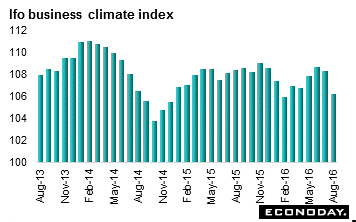 The August IFO business sentiment indicator fell more than 2 points to 106.2, the second monthly decline in a row and the lowest reading since February. The deterioration reflected 2 point losses in both sub-indexes. Current conditions declined to 112.8, the lowest level since January while business expectations slid to 100.1, the lowest level since February. At a sector level, morale was down in most areas particularly in retailing which fell 7.7 points to 2.5, the lowest mark in over a year, and in wholesaling, down 6.2 points to 5.6. Manufacturing fell 3.3 points to 6.3, a 5-month low, and trade & industry as a whole was down 4 points on the month at 5.6, a six month low. The August IFO business sentiment indicator fell more than 2 points to 106.2, the second monthly decline in a row and the lowest reading since February. The deterioration reflected 2 point losses in both sub-indexes. Current conditions declined to 112.8, the lowest level since January while business expectations slid to 100.1, the lowest level since February. At a sector level, morale was down in most areas particularly in retailing which fell 7.7 points to 2.5, the lowest mark in over a year, and in wholesaling, down 6.2 points to 5.6. Manufacturing fell 3.3 points to 6.3, a 5-month low, and trade & industry as a whole was down 4 points on the month at 5.6, a six month low.
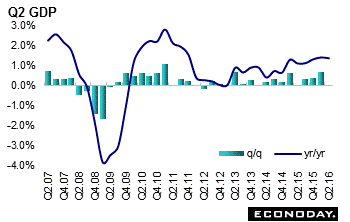 Revised second quarter gross domestic product remained at zero after a 0.7 percent increase in the first quarter. GDP was up 1.4 percent on the year. Domestic final sales contributed only 0.1 percentage points to the quarterly change in GDP, revised up from the original estimate of zero. Within this, household consumption made no contribution to quarterly GDP, while capital investment was revised down to minus 0.4 percent from the previous estimate of minus 0.2 percent. Changes in inventories made a negative contribution, subtracting 0.7 percentage points from the quarterly change, revised upward from the first estimate of a 0.4 percentage point subtraction. Foreign trade added a revised 0.6 percentage point to the quarterly change in the GDP. Revised second quarter gross domestic product remained at zero after a 0.7 percent increase in the first quarter. GDP was up 1.4 percent on the year. Domestic final sales contributed only 0.1 percentage points to the quarterly change in GDP, revised up from the original estimate of zero. Within this, household consumption made no contribution to quarterly GDP, while capital investment was revised down to minus 0.4 percent from the previous estimate of minus 0.2 percent. Changes in inventories made a negative contribution, subtracting 0.7 percentage points from the quarterly change, revised upward from the first estimate of a 0.4 percentage point subtraction. Foreign trade added a revised 0.6 percentage point to the quarterly change in the GDP.
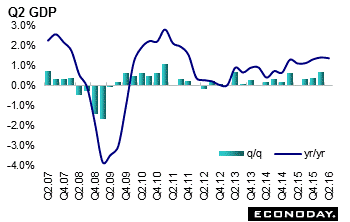 Second quarter gross domestic product was up 0.6 percent on the quarter and was up 2.2 percent from the same quarter a year ago. The first look at expenditures reveals quarterly growth based on surprisingly robust domestic demand. A marked improvement in fixed capital formation stands out (1.4 percent up from minus 0.1 percent) and within it business investment (0.5 percent up from minus 0.5 percent). Household consumption was also very strong, posting the biggest quarterly increase since the third quarter of 2014 by rising 0.9 percent after increasing 0.7 percent in the first quarter. General government final consumption, meanwhile, decreased significantly (minus 0.2 percent from 0.4 percent) from the first quarter. Second quarter gross domestic product was up 0.6 percent on the quarter and was up 2.2 percent from the same quarter a year ago. The first look at expenditures reveals quarterly growth based on surprisingly robust domestic demand. A marked improvement in fixed capital formation stands out (1.4 percent up from minus 0.1 percent) and within it business investment (0.5 percent up from minus 0.5 percent). Household consumption was also very strong, posting the biggest quarterly increase since the third quarter of 2014 by rising 0.9 percent after increasing 0.7 percent in the first quarter. General government final consumption, meanwhile, decreased significantly (minus 0.2 percent from 0.4 percent) from the first quarter.
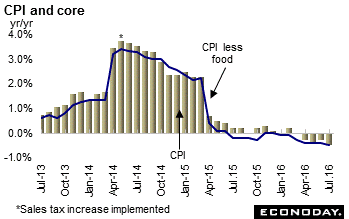 July consumer price index was up 0.2 percent on the month but down 0.4 percent from the same month a year ago as Japan continued to show no improvement in its fight against deflation. The preferred CPI excluding fresh food also was up 0.2 percent but dropped a greater than expected 0.5 percent from a year ago. However, when excluding energy along with food, the CPI was down 0.2 percent on the month but was up 0.3 percent from a year ago. Energy costs dropped 11.3 percent on the year while televisions sank 11.9 percent. Electronics were flat after climbing in June. The total CPI food excluding perishables was up 1.2 percent on the year. July consumer price index was up 0.2 percent on the month but down 0.4 percent from the same month a year ago as Japan continued to show no improvement in its fight against deflation. The preferred CPI excluding fresh food also was up 0.2 percent but dropped a greater than expected 0.5 percent from a year ago. However, when excluding energy along with food, the CPI was down 0.2 percent on the month but was up 0.3 percent from a year ago. Energy costs dropped 11.3 percent on the year while televisions sank 11.9 percent. Electronics were flat after climbing in June. The total CPI food excluding perishables was up 1.2 percent on the year.
Most equity indexes retreated on the week in light volume. Second estimates of gross domestic product were reported for France (unchanged on the quarter), Germany (up 0.4 percent from the previous quarter) and the UK (up 0.6 percent). July consumer prices in Japan tumbled for a fifth month.
The pace of new economic data picks up with the end of summer vacations with a slew of purchasing managers surveys from around the globe. And Friday is employment Friday in the U.S.
| The following indicators will be released this week... |
| Europe |
|
|
| August 29 |
Germany |
Retail Sales (July) |
| August 30 |
Eurozone |
EC Consumer & Business Sentiment (August) |
| August 31 |
Eurozone |
Harmonized Index of Consumer Prices (August flash) |
|
|
Unemployment Rate (July) |
|
Germany |
Unemployment Rate (August) |
|
France |
Consumption of Manufactured Goods (July) |
| Sep 1 |
Eurozone |
Manufacturing PMI (August) |
|
France |
Manufacturing PMI (August) |
|
Germany |
Manufacturing PMI (August) |
|
UK |
Manufacturing PMI (August) |
| Sep 2 |
Italy |
Gross Domestic Product (Q2.2016 final) |
|
UK |
Construction PMI (August) |
| |
|
|
| Asia/Pacific |
|
|
| August 30 |
Japan |
Household Spending (July) |
|
|
Consumer Price Index (July) |
|
|
Unemployment Rate (July) |
| August 31 |
Japan |
Industrial Production (July) |
| Sep 1 |
Japan |
Manufacturing PMI (August) |
|
China |
Manufacturing PMI (August) |
|
|
CFLP Manufacturing PMI (August) |
| |
|
|
| Americas |
|
|
| August 30 |
Canada |
Industrial Product Price Index (July) |
| August 31 |
Canada |
Gross Domestic Product (Q2.2016) |
|
|
Monthly GDP (June) |
| Sep 2 |
Canada |
International Trade (July) |
Anne D Picker is the author of International Economic Indicators and Central Banks.
|

